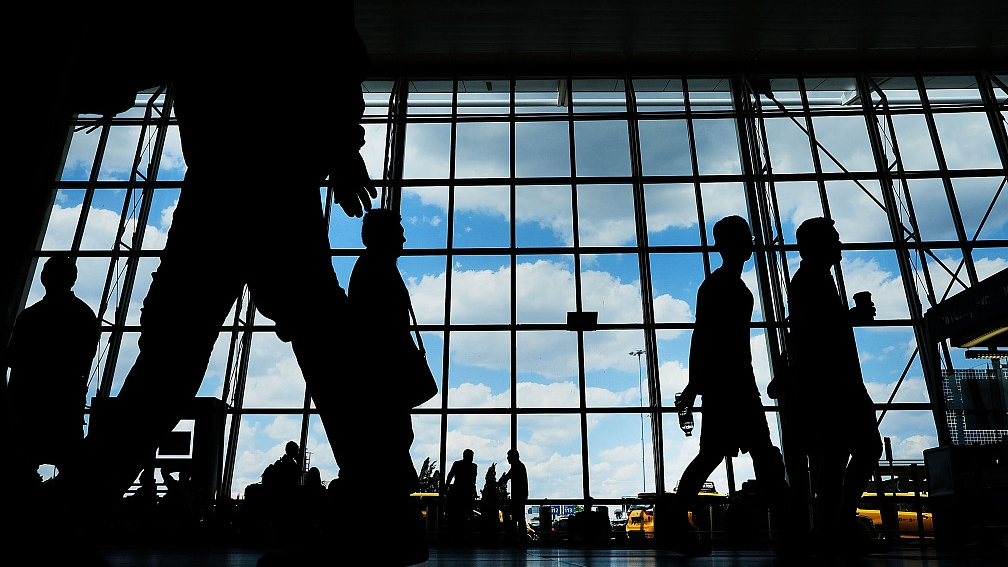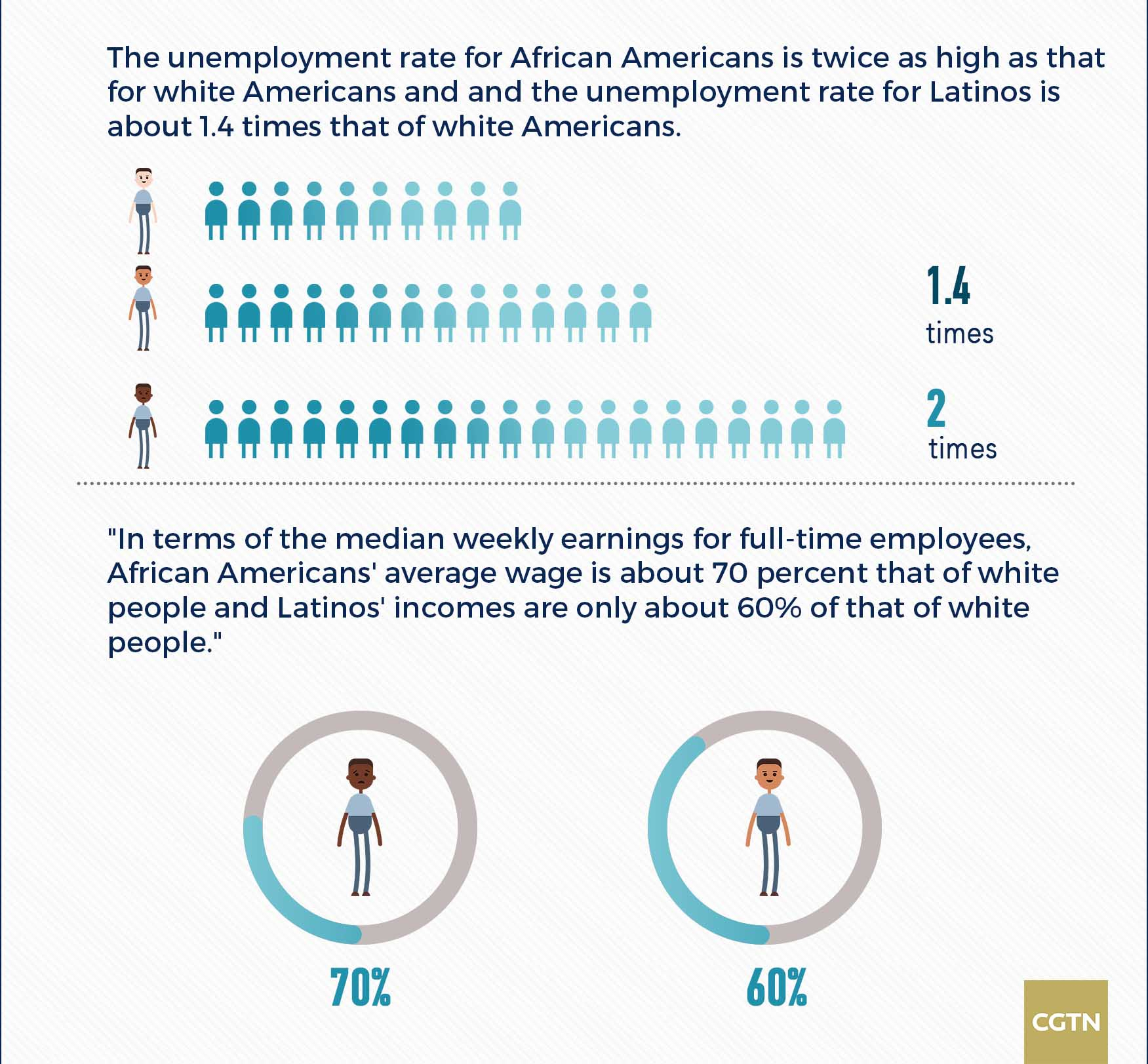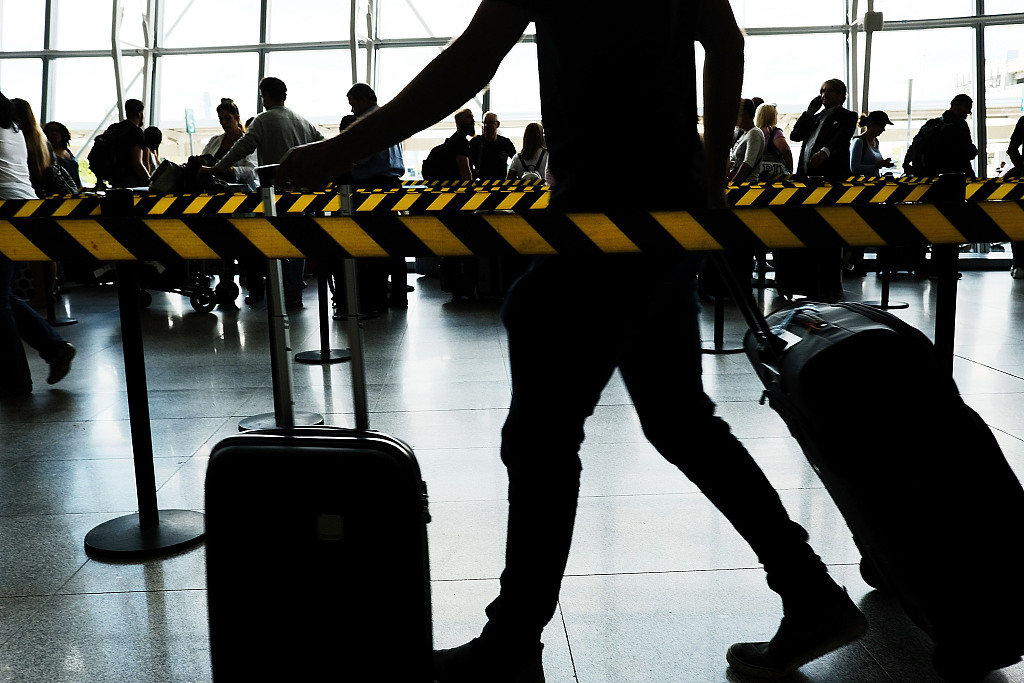

Editor's note: The China Society for Human Rights Studies released a report titled "The Deep-Rooted Racial Discrimination in the U.S. Highlights Its Hypocrisy on Human Rights" on July 26, which reveals the chronic racial discrimination existing in the United States and the hypocrisy of the U.S.-style of human rights. The report also points out that it is difficult for the U.S. to solve this problem. The following is part two of the edited version of this report. The article does not necessarily reflect the views of CGTN.
Racial discrimination in the economic sector
Racial discrimination places racial minorities in a disadvantaged position in employment, career development, earnings, and general economic conditions. Racial discrimination in the economic sector tends to be implicit, but has a decisive impact on the life of racial minorities.
Racial minorities are disadvantaged in the job market. According to data from the Bureau of Labor Statistics (BLS) from past years, people of African and Latin American ancestry have a much higher unemployment rate than those of Caucasian ancestry, and the racial differences as manifested in the employment rate have not changed with the changing economic situation. Besides, within the economic system, African and Latin Americans are making far less money than white people are. Here is the statistics from BLS data.
Racial minorities live in poverty and lack access to social welfare. According to a 2015 report by Cable News Network (CNN), the income gap between various ethnicities had widened further – the wealth possessed by white people was 12 times higher than that of African Americans and nearly 11 times higher than that of Latinos.

Source: Bureau of Labor Statistics data from 2010-2018. /Graphics by Li Yueyun
Racial discrimination in the social area
Racial minorities experience discrimination and bullying in educational institutions. According to civil rights data from the Department of Education for 2013 and 2014, of 2.8 million students who were suspended from school, 1.1 million were African Americans, and the likelihood of suspension for students of African ancestry was 2.8 times higher than that of white students.
A study reveals that students of Asian ancestry are bullied at school more than those of other ethnicities. Some 54 percent teenagers of Asian ancestry reported that they had been bullied at school, while the proportions were 38.4 percent for those of African ancestry and 34.3 percent for those of Latin American ancestry. The likelihood of students of Asian ancestry being bullied on the internet is three times that of other ethnicities.
African Americans also have experienced various forms of implicit and explicit racial discrimination. According to a November 16, 2016 report by the Financial Times, an experiment conducted by Harvard Business School proved that implicit discrimination against African Americans is universal. When requesting accommodation, applicants with distinctively African-American names were 16 percent less likely to have their bookings accepted. This study also revealed that when the name used on a resume was distinctively African-American, job applicants were significantly less likely to get an interview than when identical applications with names that could be perceived as white.
Racial discrimination against Muslims
The U.S. government carried out large-scale surveillance on Muslims. On December 1, 2011, the American Civil Liberties Union asserted that the FBI, in violation of federal laws, used its pervasive unauthorized internet access to secretly collect intelligence on Muslims and some other organizations. A report by the Pew Research Center showed that 52 percent of U.S. Muslims thought they were under government surveillance, 28 percent of Muslims claimed they had the experience of being mistaken for suspects, and 21 percent of Muslims said that they had to go through separate security checks at airports. A poll suggested that more than half of American Muslims believed that the government’s counter-terrorism policies involved additional surveillance and checks targeted solely against them.
Muslims suffered increasingly severe discrimination. On January 27, 2017, the U.S. government issued an administrative order, banning citizens of Iran, Iraq, Libya, Somalia, Sudan, Syria and Yemen from entering its territory. In view of the fact that Muslims form the majority of the population in all those countries, the order was widely interpreted as a “Muslim ban”, and it sparked widespread protests in the U.S. and many other places across the world.
In a survey by the Pew Research Center in early 2017, 75 percent of adult Muslims in America believed that discrimination against Muslims was pervasive in the country, while 69 percent of the general public held the same view. Half of Muslims felt that it had become more and more difficult to be a Muslim in the US in recent years.

People arrive at John F. Kennedy (JFK) International Airport in New York City, June 26, 2017. In January the same year, the U.S. government banned citizens of Iran, Iraq, Libya, Somalia, Sudan, Syria and Yemen from entering its territory. The order was widely interpreted as a “Muslim ban” and sparked widespread protests across the world. /VCG Photo
Religious discrimination is on the rise as events involving insults and attacks against Muslims increased in number. Muslims make up less than one percent of the U.S. population, but 14 percent of the religious discrimination cases investigated by the federal government have involved Muslims, as have one quarter of the religious discrimination cases in workplaces. According to a Pew Research Center analysis of the FBI statistics on hate crime, attacks against Muslims in America grew significantly in number from 2015 to 2016, exceeding the peak level following the 9/11 attacks in 2001.
According to an October 22, 2018 article on the website of The Guardian, the U.S. midterm elections that year had seen a dramatic rise in anti-Muslim rhetoric. A report showed that conspiracy theories targeting Muslims had increasingly entered the political mainstream. More than a third of the candidates claimed that Muslims are inherently violent or pose an imminent threat, and just under a third of the candidates called for Muslims to be denied basic rights or declared that Islam is not a religion, the report found.
Racial discrimination against immigrants
The U.S. government used slanders and violence against immigrants. The Washington Post reported on November 26, 2018 that the U.S. authorities fired tear gas on multiple occasions at the US border with Mexico to stop immigrants from Central America, causing many injuries. On November 28, 2018, a group of UN experts jointly signed letters to voice their concerns about the racist and xenophobic languages and practices used by U.S. authorities, which fly in the face of international human rights standards. The letters said that the official response in that country stigmatizes migrants and refugees, equating them with crime and epidemics, which also fuels a climate of intolerance, racial hatred and xenophobia against those perceived as non-white, creating hostile emotional environments. The list of signatories is as below.
Read other parts of the report "The Deep-Rooted Racial Discrimination in the U.S. Highlights Its Hypocrisy on Human Rights":
Part One: Racial discrimination rife in the U.S.
Part Three: Racial discrimination – a flashpoint for social conflict in the U.S.
Part Four: Racial problems in the U.S. – a structural obstacle hard to overcome
Editor: Huang Jiyuan
Graphic designer: Li Yueyun.
(If you want to contribute and have specific expertise, please contact us at opinions@cgtn.com)

Copyright © 2018 CGTN. Beijing ICP prepared NO.16065310-3
Copyright © 2018 CGTN. Beijing ICP prepared NO.16065310-3